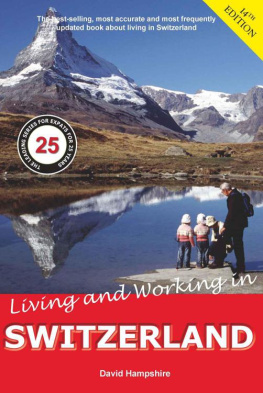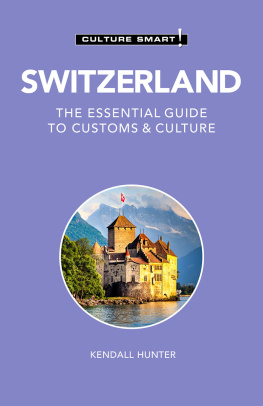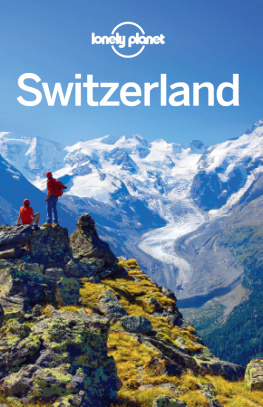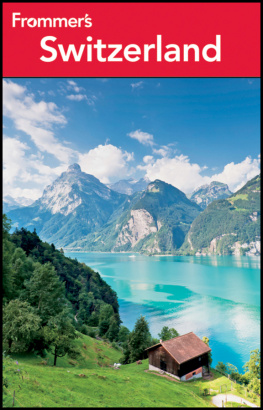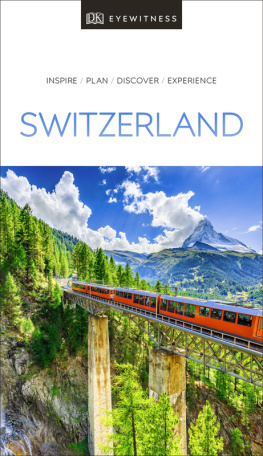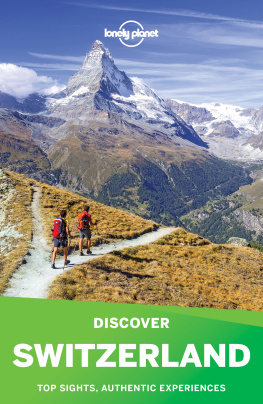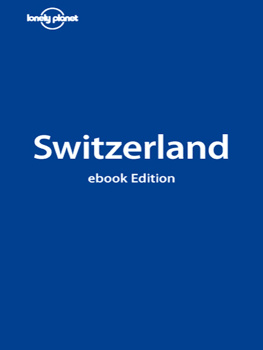

First published in 1988
All rights reserved. etc.
Copyright Survival Books 2013
ISBN 9781909282643
ACKNOWLEDGEMENTS
My sincere thanks to all those who contributed to the successful publication of this 14th edition of Living and Working in Switzerland and the previous editions of this book. I would particularly like to thank Dianne Hauptli for research and updating; Peter Read for editing and further research; David Woodworth for proof-reading; Di Tolland for desktop publishing, photo selection and cover design; and Jim Watson for the illustrations, cartoons and maps.
IMPORTANT NOTE
Switzerland is a diverse country with many faces. It has four national languages, both federal and canton laws, a variety of religions and customs, and continuously changing rules and regulations particularly with regard to foreigners.
Always check with an official and reliable source (not always the same) before making any major decisions or taking an irreversible course of action. Dont, however, believe everything youre told or read, even, dare I say it herein!
To help you obtain further information and verify data with official sources, useful addresses and references to other sources of information have been included in all chapters, and in Appendices A to C. Important points have been emphasised throughout the book, some of which it would be expensive or foolish to disregard. Ignore them at your peril or cost.
Unless specifically stated, the reference to any company, organisation or product in this book doesnt constitute an endorsement or recommendation. None of the businesses, products or individuals listed have paid to be mentioned (apart from the advertisers).
AUTHORS NOTES
- Frequent references are made in this book to the European Union (EU), which comprises Austria, Belgium, Bulgaria, Cyprus, the Czech Republic, Denmark, Estonia, Finland, France, Germany, Greece, Hungary, Ireland, Italy, Latvia, Lithuania, Luxembourg, Malta, the Netherlands, Poland, Portugal, Romania, Slovakia, Slovenia, Spain, Sweden and the UK. The European Economic Area (EEA) includes the EU countries plus the European Free Trade Association (EFTA) countries of Iceland, Liechtenstein and Norway plus Switzerland. (Switzerland is a member of EFTA, but isnt a member of the EEA.)
- All times are shown using the 12-hour clock; times before noon are indicated by the suffix amand times after noon by pm.
- Unless otherwise stated, all prices quoted are in Swiss francs (CHF) and include VAT. They should be taken as estimates only, although they were mostly correct at the time of publication and fortunately dont change overnight in Switzerland.
- His/he/him also means her/she/her (please forgive me ladies). This is done to make life easier for both the reader and the author, and isnt intended to be sexist.
- British English and spelling is used throughout the book. Names of Swiss towns and foreign words are generally shown in their English spelling, e.g. Basle (Basel), Berne (Bern), Geneva (Genve), Lucerne (Luzern) and Zurich (Zrich).
- Warnings and important points are printed in bold type.
- Lists of Useful Addresses , Further Reading and Useful Websites are contained in Appendices A , B and C respectively.
- For those unfamiliar with the metric system of Weights & Measures , conversion tables are included in Appendix D .
- Maps showing the cantons, a physical map and communications (airports, rail, road) are included in Appendix E .
INTRODUCTION
Whether youre already living or working in Switzerland or just thinking about it this is THE BOOK for you. Forget about those glossy guide books, excellent though they are for tourists; this book was written especially with you in mind and is worth its weight in Emmental cheese (and not just the holes!). Furthermore, this fully revised and updated 14th edition is printed in colour. Living and Working in Switzerland has been written to meet the needs of anyone wishing to know the essentials of Swiss life however long your intended stay, youll find the information contained in this book invaluable.
In contrast to the wealth of information provided by Switzerland Tourism, reliable and up-to-date information specifically intended for foreigners living and working in Switzerland isnt so easy to find particularly in the English language. Our aim in publishing this book was to help fill this void, and provide the comprehensive, practical information necessary for a relatively trouble-free life. You may have visited Switzerland as a tourist, but living and working theres a different matter altogether. Adjusting to a different environment and culture and making a home in any foreign country can be a traumatic and stressful experience and Switzerland is no exception.
Living and Working in Switzerland is a comprehensive handbook on a wide range of everyday subjects and represents the most up-to-date source of general information available to foreigners in Switzerland. It isnt, however, simply a monologue of dry facts and figures, but a practical and entertaining look at life. Adjusting to life in a new country is a continuous process, and although this book will help reduce your novice phase and minimise the frustrations, it doesnt contain all the answers (most of us dont even know the right questions to ask!). What it will do, however. is help you make informed decisions and calculated judgements, instead of uneducated guesses and costly mistakes. Most importantly, it will help save you time, trouble and money, and repay your investment many times over.
Although you may find some of the information a bit daunting, dont be discouraged. Most problems occur only once and fade into insignificance after a short time (as you face the next half a dozen ). Most foreigners in Switzerland would agree that, all things considered, they love living there. A period spent in Switzerland is a wonderful way to enrich your life, broaden your horizons, and, with any luck (and some hard work) you may even make your fortune. I trust this book will help you avoid the pitfalls of life in Switzerland and smooth your way to a happy and rewarding future in your new home.
Viel Glck/Bon courage! David Hampshire
CHAPTER 1: FINDING A JOB
Finding a job in Switzerland isnt as difficult as official Swiss policy may lead you to believe, although obtaining a permit can prove a problem if you arent an EU/EFTA national. The European Union (actually the European Economic Area/EEA, which comprises the EU countries plus the EFTA countries) and Switzerland have a bilateral agreement that allows the free movement of people and removes the need for permits (there are no work permit quotas for most EU nationals).
Switzerlands economic success is largely dependent upon the influx of foreign labour, and foreigners are found in almost every walk of life. Many companies have a sizeable foreign labour force and foreigners fill almost half the top positions at the 25 largest Swiss companies (including two-thirds of the companies quoted on the Swiss stock exchange). Foreign employees in Switzerland number over 1.25m or some 30 per cent of the workforce.
In addition to resident foreigners, over 200,000 people cross the border each day to work in Switzerland.
At the end of 2011, over 85 per cent of Switzerlands permanent resident foreign population was of European origin, with some two-thirds of the foreign workforce from EU-15 or EFTA countries. Italians, Germans and Balkan countries each comprise around 16 per cent of the foreign workforce, followed by the Portuguese with around 13 per cent. Almost a quarter of foreign residents were born in Switzerland and belong to second (called Secondos ) or third-generation families. Some 30 per cent of resident Italians but only around 6 per cent of Germans were born in Switzerland. Almost half of the foreign resident population have been in Switzerland for over 15 years and around 90 per cent of Italian and Spanish residents have permanent resident status.
Next page
